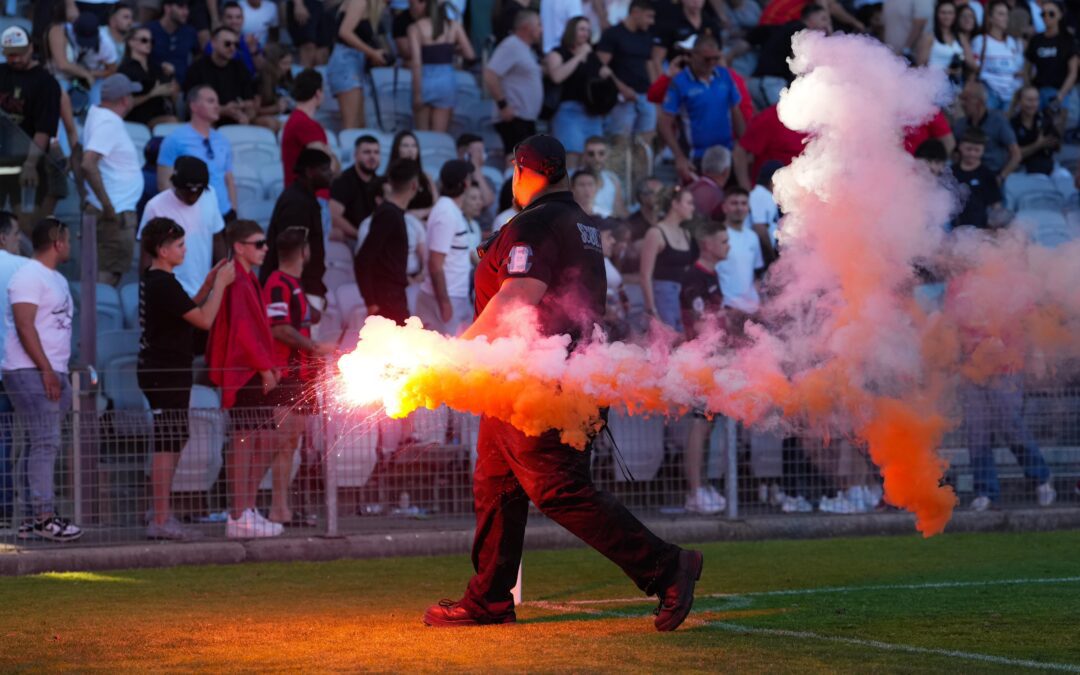A record crowd at Wollongong’s WIN Stadium sat in anticipation as the 2023 Men’s Illawarra Premier League Grand Final entered its final stages; Coniston – a club recently confined to community-competition obscurity – looked like it was about to return to its former glory and raise the Illawarra’s historic football trophy. When referee Andrew Naylor blew his whistle to confirm the fairy tale, fiery dynamite-shaped sticks were hurled onto the pitch. Fans squirmed away from the smoke filling the ground, while those on the grass dodged the projectiles. It was a story of flares: the climax of a troublesome year for the local men’s game.
A week earlier, on a sunny Sunday afternoon, Woonona and Shellharbour stepped onto Ian McLennan Park for the inaugural women’s Illawarra Premier League decider. As the players gazed across the venue, they saw toddlers chasing footballs down the dipping green hills, and couples lying on picnic rugs, all of them there to support their friends and relatives. It was a snapshot of the bright future for women’s football in the Illawarra.

Football South Coast (FSC) Competition Coordinator Bobby Mazevski has been involved in the local game as a player, referee, and administrator for over three decades. He said that he’s never seen local men’s football filled with so much ill-discipline, and what he describes as a major cultural shift that is far removed from the culture of local women’s football.
“This year particularly has been rife with all sorts of disciplinary issues. And not just on the field, but we’re talking off the field as well,” Mazevski said.
“It’s a lack of respect, and it’s just a lack of being able to comply.
“When you compare the men’s and women’s games, it’s really chalk and cheese.
“I think women tend to play the game in the right spirit, whereas the men’s competitiveness gets the better of them.”
The FSC men’s game saw a sharp spike in suspensions, breaking many records.
Thirty-six teams breached FSC’s misconduct notice, which requires a team to receive five or more cards in a game. Twenty-nine coaches were suspended, up from the usual eight, while one player was given ten yellow cards for the first time in a season.
Of the 159 red cards handed out in 2023, 157 were in the men’s competition – two were in the women’s.
Forty per cent of these send-offs concerned foul and abusive language – mostly targeted at referees, and two months into the season, this had alarm bells blaring in the FSC offices. FSC has experienced many referees walking away from the game over the last decade, particularly younger ones. This has resulted in games rarely having a full set of registered referees.
Following discussions with officials and the men’s council, an emergency meeting was called with the clubs. It was made clear to clubs that there were too many incidents requiring disciplinary sanctions at this early stage. However, there was no reduction in the number of sanctions given.
The Association’s chief executive officer, Ann-Marie Balliana, said the extra pressure on coaches and players due to the pay-per-game contract system in the FSC Men’s Premiership is at the heart of the men’s game’s toxicity. Players and coaches in the competition receive payment from their clubs, and some have extra incentives for playing well or winning trophies. She compared that with the women’s game, which doesn’t have the same money-hungry competition.
“There’s more pressure on clubs [in men’s]. More pressure on coaches, and I think you can see that intensity sometimes magnifies the reaction of players, of coaches, which leads to the disciplinary issues,” Balliana said.
“I think it’s just young males influenced by people around them.
“I think females tend to be a little bit more headstrong and have more common sense.
“The women’s game is still evolving, and the intensity is certainly there, but it’s not this payment system that I think does contribute to it.
“They’re just grateful that there’s a spotlight on them now, and they’re appreciative, whereas the men take it a little bit more for granted.”
Balliana elaborated that social media also plays a role, with people looking for commendation for stunts like throwing flares on the field. This ‘lad’ mentality was illustrated in the Facebook comments posted on the Illawarra Mercury’s article concerning the investigation into the flares at WIN Stadium.

FSC’s attention ahead of next season has turned to eradicating the abuse and resetting the image of the men’s competitions that has taken a hit this year. Mazevski said they are looking at stronger sanctions for poor behaviour while improving spectator numbers through the gates. But he said fans also contribute to the current issues in men’s football. One suggested sanction is an increased loss of competition points for bad behaviour. One club suffered this punishment in 2023, losing a point that cost them a semi-final qualification spot.
“We would certainly like to bump up the crowds and have more people attend. But by the same token, we’re seeing a lot of the crowd also giving it to referees, so the culture there is still not good, and we need clubs to help further create the message of respect for match officials and the players. It’s certainly not a good look. We’ve had numerous sponsors going out to games as neutrals, and potentially, there’s a CEO that might go out and watch a game, and then we approach them and ask if they want to sponsor FSC or the men’s competition. Their answer will be, ‘No, because I know what you guys are about: sitting there barking orders, swearing, and carrying on at referees’. It’s not something a company wants to be involved in,” Mazevski said.
Balliana said there is a divide across men’s, women’s, and junior’s local football, as clubs may have a men’s, women’s or junior team but rarely all three. This reflects supporter bases on matchday, with few women and children at men’s games, for example. She said she wants to see a family-friendly atmosphere across all local games.
“The Men’s and Women’s Premier Leagues are something we should be very proud of. I think they’re such high-profile competitions, and I know a lot of associations aspire to get to where we are as an association. But there is this gap between our junior clubs and our senior clubs because they’re not unified. To me, a family-friendly environment is where you can see the under-sixes or under-sevens of a club turning up to watch and support the first-grade team. If they don’t go on to play representative football, there’s this great pathway for them locally, and it’s full of families, it’s full of young kids – the kids get to play at halftime and walk out with the players,” Balliana said.
“The players play fair; they’re setting a great example for the kids, and the kids will see that and want to stay in the game for as long as they can. That’s where we need to get to.”
With football’s local popularity ever-increasing, the Illawarra game’s future accordingly rests in the manifestation of this vision.
Image Credit: Graham Brown

